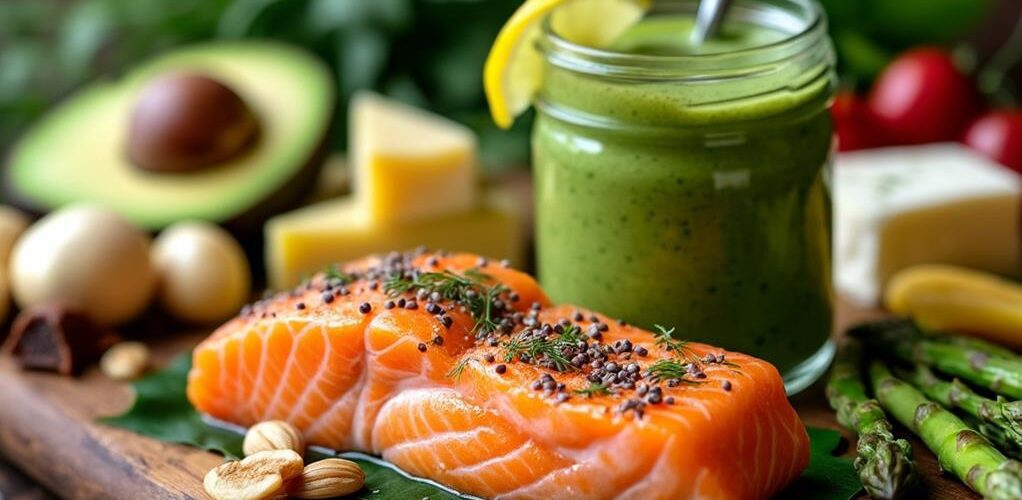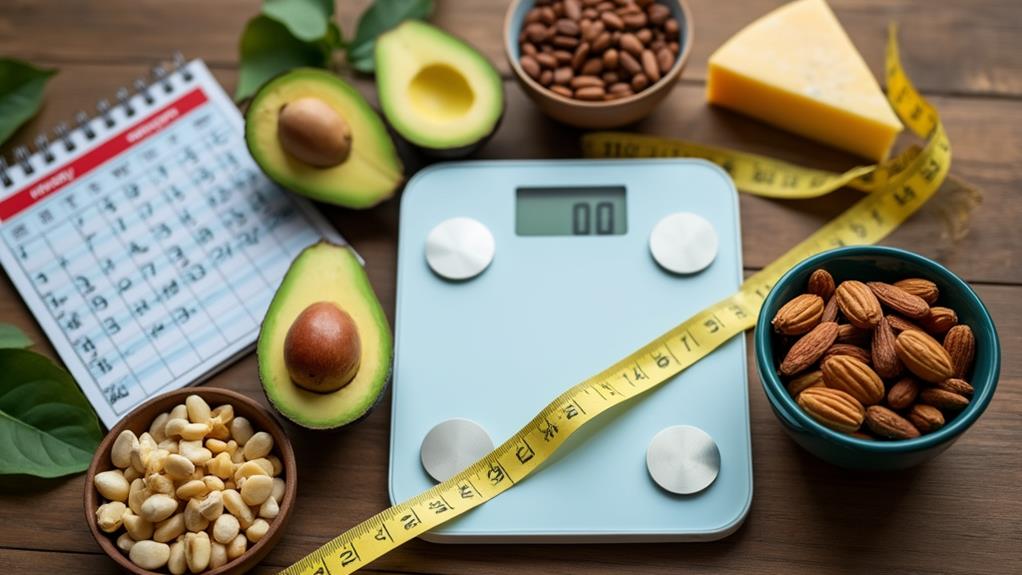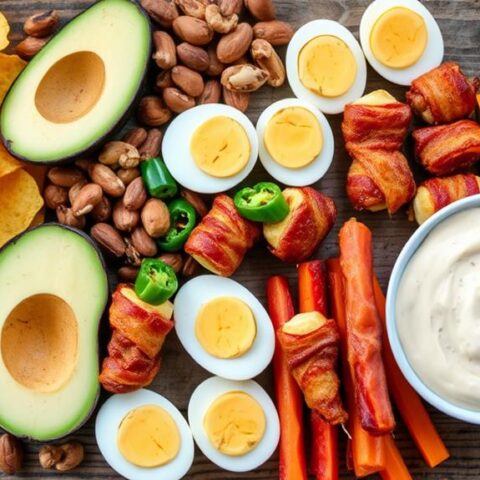
To gain weight on a keto diet, start by calculating your caloric needs and achieving a surplus of 200-300 calories. Focus on nutrient-dense foods like avocados, nuts, and full-fat dairy to boost calorie intake while maintaining ketosis. Incorporate high-quality proteins evenly across meals, ensuring 0.8 to 1 gram per pound of body weight. Emphasize frequent meals and energy-dense snacks, such as nut butters and dark chocolate. Engage in strength training exercises to support muscle growth and manage stress and sleep for ideal recovery. Monitoring progress and leveraging community support are essential strategies for success. Discover more effective tactics.
Key Takeaways
- Increase fat intake by 30 grams daily to establish a caloric surplus while maintaining keto-friendly macronutrient ratios.
- Consume 5-6 meals daily, including energy-dense snacks like nut butters and full-fat cheese, to boost calorie intake.
- Incorporate high-quality proteins, like grass-fed beef and fatty fish, evenly across meals to support muscle growth.
- Utilize nutrient-dense foods, such as avocados and nuts, to enhance calorie density and support weight gain.
- Engage in strength training 2-3 times weekly, focusing on compound exercises for balanced muscle development.
Understand Your Caloric Needs
To effectively gain weight on a keto diet, it is vital to understand your caloric needs by calculating a precise caloric surplus tailored to your body metrics.
Begin by determining your maintenance level, which is the number of calories required to sustain your current weight without gaining or losing. This can be efficiently calculated using a caloric calculator that takes into account factors such as age, sex, weight, height, and activity level.
Once your maintenance level is established, aim for a caloric surplus of 200-300 calories above this baseline to encourage gradual weight gain.
It is also important to distribute protein intake evenly across meals to enhance muscle synthesis and maintain ketosis, guaranteeing that your protein intake supports muscle maintenance and overall health.
For individuals seeking ideal muscle gain on a keto diet, maintaining an appropriate protein intake is vital. Target approximately 0.8 to 1 gram of protein per pound of body weight, which supports muscle synthesis while adhering to keto guidelines.
Additionally, to confirm you remain in ketosis, monitor your macronutrient ratios closely, typically maintaining 60% fat, 30% protein, and 10% carbohydrates.
Regularly tracking your daily caloric intake through food-tracking apps or journals is recommended to verify adherence to your caloric goals.
Should your weight gain stall, consider adjusting your intake by an incremental 100-200 calories.
Prioritize Nutrient-Dense Foods
To effectively gain weight on a keto diet, it is essential to prioritize nutrient-dense foods by choosing quality over quantity.
Incorporating healthy fats from sources such as avocados, nuts, and olive oil guarantees a calorie surplus without exceeding carbohydrate limits.
Additionally, focusing on high-quality proteins, such as grass-fed beef, and full-fat dairy products can support muscle growth and overall nutritional needs.
Grass-fed beef is rich in omega-3s and CLA, which are beneficial for overall health, making it an excellent choice for those on a keto diet seeking to gain weight healthily.
Choose Quality Over Quantity
When aiming to gain weight on a keto diet, prioritizing the quality of your food selections over sheer quantity is fundamental. This approach involves focusing on nutrient-dense foods that supply necessary vitamins and minerals while aiding in healthy weight gain. Utilizing macro tracking and meal prep can help guarantee that your diet remains balanced and aligned with keto principles. By choosing whole foods like avocados, nuts, and fatty fish, you not only enhance calorie intake but also support overall health.
| Food Type | Examples | Benefits |
|---|---|---|
| Nutrient-Dense | Avocados, nuts, fatty fish | Important vitamins and minerals |
| High-Quality Protein | Eggs, full-fat dairy | Supports muscle growth |
| Low-Carb Vegetables | Spinach, broccoli | Maximizes nutrient intake, low carbs |
Including high-quality protein sources such as eggs and full-fat dairy, aiming for approximately 0.8 to 1 gram of protein per pound of body weight, is imperative for muscle development. Additionally, incorporating healthy fats from olive oil, coconut oil, and fatty cuts of meat increases calorie density, essential for weight gain without surpassing carbohydrate limits. Emphasizing whole foods instead of processed options guarantees that you receive more nutrients, supporting muscle building and avoiding empty calories that may impede weight gain efforts.
Focus on Healthy Fats
Consistently focusing on healthy fats is paramount when attempting to gain weight on a keto diet, as they serve as the primary source of energy and play an essential role in maintaining ketosis.
Prioritizing fat sources such as avocados, nuts, seeds, and fatty fish is vital, given their high caloric density and nutritional value. Opt for healthy oils like olive oil and coconut oil, which not only enhance flavor but also contribute to achieving the desired fat ratios important for weight gain.
Incorporating full-fat dairy products, such as cheese and cream, into your cooking methods can provide a significant calorie boost while adding flavor enhancers to dishes.
Meal timing is also important; strategically plan your intake of high-fat foods throughout the day to guarantee a steady supply of energy. Snack ideas like nut butters and olives offer nutrient-dense options that are both keto-friendly and calorie-rich.
Mindful portion control is necessary to guarantee sufficient caloric intake; even healthy fats must be consumed in adequate amounts to facilitate weight gain.
Aim for fats to comprise about 60% of your total caloric intake, focusing on nutrient-dense, energy-rich foods that provide essential vitamins and minerals without excessive carbohydrate consumption.
Increase Healthy Fat Intake
Enhancing your fat intake is an essential component of successfully gaining weight on a keto diet. To achieve this, consider incorporating energy-dense foods like avocados, nuts, and seeds into your meal prepping routine. These ingredients not only boost healthy fat intake but also maintain the low-carb profile necessary for ketosis.
Aiming for fats to account for 60-70% of your daily caloric intake will help guarantee you remain in ketosis while promoting weight gain. Additionally, it's important to focus on healthy fats from avocados and other sources to optimize your health benefits while following the keto diet.
Utilizing healthy oils such as olive oil and coconut oil is another effective strategy. These oils can be used in cooking or as dressings, offering concentrated calories without increasing carbohydrate intake. Full-fat dairy products, like cheese and yogurt, are also excellent sources of healthy fats and contribute greatly to your caloric surplus.
Including fatty fish like salmon and mackerel in your diet is beneficial, as they provide essential omega-3 fatty acids that support muscle growth and recovery.
Additionally, incorporating keto friendly desserts made with high-fat ingredients can be an enjoyable way to further increase your fat consumption. By focusing on these strategies, you can effectively enhance your healthy fat intake and support your weight gain goals on a keto diet.
Optimize Protein Consumption
In addition to increasing healthy fat intake, maximizing protein consumption is essential for supporting muscle growth and maintaining a balanced ketogenic diet. Aiming for approximately 0.8 to 1 gram of protein per pound of body weight each day guarantees that your body receives adequate nutrients for muscle repair and growth.
It's important to remember that careful macronutrient management is critical to avoid disrupting ketosis. It is important to focus on protein quality by incorporating high-quality sources such as eggs, fatty fish, full-fat dairy, and lean meats. These foods provide essential amino acids necessary for peak muscle health.
Meal timing plays a significant role in maximizing muscle protein synthesis. Distributing your protein intake evenly across meals, with an ideal target of 20-30 grams per meal, can enhance the body's ability to build and repair muscle tissue throughout the day. This approach helps maintain consistent amino acid levels in the bloodstream, promoting anabolic processes.
While increasing protein is essential, it is equally important to monitor intake to prevent excessive consumption, which may lead to gluconeogenesis and interfere with ketosis.
To achieve the desired caloric density, pair protein-rich foods with healthy fats like avocado or olive oil, maintaining macronutrient ratios conducive to a ketogenic diet while supporting weight gain.
Embrace Frequent Eating

Frequent eating is a fundamental strategy for achieving a caloric surplus necessary for weight gain on a ketogenic diet. By consuming 5-6 meals a day, individuals can effectively surpass their daily caloric needs without experiencing overwhelming fullness. This approach, combined with precise meal timing, guarantees that one capitalizes on natural hunger signals, preventing unintentional fasting periods that can hinder weight gain. Incorporating liquid calories such as smoothies made with full-fat dairy or coconut milk can provide essential nutrients without the bulk of solid foods, further aiding in maintaining a consistent caloric intake.
To manage meal timing effectively, it is beneficial to set reminders or employ meal prep strategies. This consistency is pivotal to avoid skipped meals, which could disrupt the balance needed for sustained weight gain. High-fat ingredients like avocados and olive oil guarantee meals remain calorie-dense and keto-friendly.
| Meal Components | Benefits | Suggested Foods |
|---|---|---|
| High-Fat Ingredients | Increases calorie density | Avocados, Olive Oil |
| Liquid Calories | Adds nutrition, reduces bulk | Full-fat Dairy, Coconut Milk |
| Frequent Meals | Maintains caloric surplus | 5-6 small meals daily |
Implementing these strategies promotes a structured approach to gaining weight on a keto diet.
Choose Energy-Dense Snacks
To effectively gain weight on a keto diet, selecting energy-dense snacks is essential. These snacks are nutrient-rich, high in calories, and packed with healthy fats, supporting increased caloric intake without excessive bulk. Here are some recommendations:
1. Nut Butter Benefits: Nut butters, such as almond or peanut, are calorie-dense and provide healthy fats and protein. They are convenient and can be incorporated into various meals or snacks throughout the day.
Consider adding natural sweeteners like erythritol to nut butter recipes for a touch of sweetness without disrupting ketosis.
2. Avocado Varieties: Avocados are extremely versatile and rich in calories and fats. Incorporating different avocado varieties into your meals can add approximately 240 calories per fruit, aiding in healthy weight gain.
Pairing avocados with keto-friendly sweeteners, such as monk fruit, can enhance flavor while maintaining low carb intake.
3. Cheese Choices: Full-fat cheese options, like cheddar or gouda, are excellent for a keto diet. With around 110 calories per ounce, cheese can be easily added to salads, omelets, or consumed as a standalone snack.
4. Dark Chocolate Options: Opt for dark chocolate with 70% cocoa or higher. This choice provides not only a satisfying treat but also approximately 170 calories and 12 grams of fat per ounce, along with antioxidants.
Incorporate Strength Training

To effectively gain weight on a keto diet, incorporating strength training is essential, focusing on compound exercises such as squats, deadlifts, and bench presses.
Prioritizing progressive overload by gradually increasing the weight used in training sessions will stimulate muscle growth, while ensuring balanced development through a training frequency of 2-3 times per week.
This approach not only supports muscle repair and growth but also helps monitor progress through strength gains and body measurements.
Focus on Compound Exercises
Engaging in compound exercises is a highly effective strategy for individuals aiming to gain weight on a keto diet through strength training. Compound lifts like squats, deadlifts, and bench presses have numerous benefits, such as enhanced muscle engagement and increased metabolic rate.
These exercises recruit multiple muscle groups simultaneously, making them more efficient than isolation exercises for building muscle mass.
To maximize results and prevent injuries, follow these guidelines:
- Warm-up Importance: Always start with a proper warm-up to prepare your muscles and joints, reducing the risk of injury and improving performance.
- Technique Mastery: Focus on mastering the correct form and technique of compound lifts. Proper execution is essential to avoid injuries and guarantee efficient muscle engagement.
- Strength Training Routines: Incorporate 2-3 heavy training days per week, utilizing a low-rep, high-weight protocol (e.g., 5 sets of 5 reps) to stimulate muscle hypertrophy.
- Recovery Strategies: Allow adequate recovery time between sessions. This is critical for muscle repair and growth, enabling progressive weight progression and increased training intensity over time.
Prioritize Progressive Overload
Having established a strong foundation with compound exercises, the next step to effectively gaining weight on a keto diet is prioritizing progressive overload in your strength training routine. Progressive overload is vital as it involves gradually increasing the weight, frequency, or intensity of your exercises, thereby stimulating muscle growth essential for weight gain. Utilizing proper lifting techniques and workout variations, such as altering grip width or stance in exercises, can guarantee continuous muscle engagement and prevent plateaus.
A structured approach to progressive overload might include focusing on lifting heavy weights with lower repetitions, such as 5 sets of 5 reps, performed 2-3 times per week. This strategy maximizes muscle hypertrophy while allowing time for recovery, essential for muscle repair and growth. Monitoring your progress through tracking strength gains and body measurements helps in adjusting the training regimen to consistently challenge muscles.
Incorporating compound exercises like squats and deadlifts remains pivotal, engaging multiple muscle groups and maximizing results within 30-60 minute sessions.
| Exercise | Reps & Sets | Frequency |
|---|---|---|
| Squats | 5 sets of 5 reps | 2-3 times/week |
| Deadlifts | 5 sets of 5 reps | 2-3 times/week |
| Bench Press | 5 sets of 5 reps | 2-3 times/week |
| Overhead Press | 5 sets of 5 reps | 2-3 times/week |
| Barbell Rows | 5 sets of 5 reps | 2-3 times/week |
This structured approach guarantees steady progress and effective weight gain on a keto diet.
Balance Training Frequency
Balancing the frequency of your training sessions is vital to optimizing muscle growth and weight gain on a keto diet. Incorporating strength training 2-3 times per week focuses on maximizing training intensity while allowing for adequate recovery strategies.
Prioritize compound exercises, such as squats and deadlifts, to efficiently stimulate multiple muscle groups. Here's how to structure your sessions effectively:
- Session Duration: Aim for concise workouts lasting 30-60 minutes to prevent fatigue and support muscle engagement. This duration allows for technique refinement and reduces the risk of injury, aligning with your performance goals.
- Workout Variations: Employ a low-rep, high-weight protocol, such as 5 sets of 5 reps, to promote muscle growth. Guarantee all muscle groups are targeted at least twice a week, focusing on balanced muscle development.
- Recovery Strategies: Allow sufficient time between sessions to prevent overtraining and increased cortisol levels, both of which can impede weight gain. Proper recovery is critical for muscle repair and growth.
- Progression Tracking and Motivation Methods: Consistently monitor progress through strength gains and track your advancements. This tracking not only aids in setting realistic performance goals but also helps maintain motivation over time.
Manage Stress and Sleep
How can managing stress and sleep greatly influence your weight gain efforts on a keto diet? Effective sleep hygiene and stress management are essential components. Achieving 7-9 hours of quality sleep nightly promotes muscle recovery and hormone balance, crucial for weight gain.
Sleep consistency is important; maintaining a regular sleep schedule enhances sleep quality and supports the muscle-building processes. Limiting caffeine intake before bedtime also contributes to ideal rest. During the initial phase of a ketogenic diet, some individuals may experience keto insomnia, characterized by difficulty falling asleep and frequent awakenings. Addressing these potential sleep disturbances early on can further strengthen your weight gain efforts.
Stress management is equally significant, as chronic high stress raises cortisol levels, potentially leading to muscle breakdown rather than growth. To combat this, integrate mindfulness practices and relaxation techniques into your daily routine. These approaches not only facilitate cortisol reduction but also aid in appetite regulation by balancing hormones such as ghrelin and leptin, which are important for weight management.
Engaging in regular social interactions and relaxation practices can further alleviate stress, enhancing overall well-being and supporting weight gain objectives. These activities serve as effective recovery strategies, promoting a positive mental state and physiological environment conducive to weight gain on a keto diet.
Monitor Progress Regularly

Monitoring your progress regularly is essential for achieving healthy weight gain on a keto diet.
Begin by tracking changes in your weight and adjusting your caloric intake to guarantee a gradual increase of 1-2 pounds per week.
Regularly measure your body composition using body composition scales for detailed insights, making sure that the weight gained is mainly lean mass rather than fat.
Additionally, evaluate your body composition to make sure that the weight gained is mainly lean mass rather than fat.
Track Weight Changes
To effectively monitor your progress on a keto diet aimed at weight gain, it is vital to regularly track changes in your weight and body composition.
Accurate weight tracking and the use of precise measurement methods can greatly enhance your understanding of how your body responds to dietary changes.
Consider the following strategies to guarantee reliable data collection:
- Consistent Weigh-ins: Weigh yourself at the same time each week, preferably in the morning after using the restroom. This practice helps in eliminating variables such as food and water intake, providing a clearer picture of true weight changes.
- Diverse Measurement Tools: Utilize a variety of tools, such as scales and body fat calipers, to assess both weight and body composition. This thorough approach allows for a more detailed analysis of muscle versus fat gains.
- Food and Activity Logging: Maintain a detailed food diary or use an app to track daily caloric and macronutrient intake. This guarantees you are in a caloric surplus, critical for weight gain.
- Goal Setting and Evaluation: Establish realistic weight gain targets, such as 0.5 to 1 pound per week. If progress stalls for two consecutive weeks, reassess your approach to guarantee continued advancement.
Adjust Caloric Intake
Effectively adjusting caloric intake is fundamental for achieving weight gain on a keto diet, and it often requires regular monitoring. To start, establish a caloric surplus of 200-300 calories above your maintenance needs, determined through a calorie calculator that aligns with your activity level and specific goals. This foundational step guarantees you are consuming more energy than you expend, which is essential for weight gain.
Regularly tracking daily caloric intake is important, utilizing food-tracking apps or journals to maintain accuracy. By doing so, you can confirm that you consistently meet your caloric targets. If weight gain stalls, caloric adjustments may be necessary. For many, increasing fat intake by approximately 30 grams daily can be an effective strategy, as fats are a primary caloric source on the keto diet, supporting both energy levels and weight gain.
In addition to caloric adjustments, meal timing plays a significant role. Incorporating multiple meals and snacks throughout the day can help achieve the required caloric surplus without the discomfort of large, infrequent meals.
Monitoring weight and caloric intake weekly helps identify when these adjustments are needed, facilitating steady progress towards your weight gain goals.
Evaluate Body Composition
Evaluating body composition is a critical component of tracking progress while attempting to gain weight on a keto diet. This analysis helps differentiate between muscle gain and fat loss, ensuring that your diet adjustments are effective.
Regularly using advanced measurement techniques such as body fat calipers, DEXA scans, or bioelectrical impedance provides accurate insights into your body composition. Here's how to effectively monitor your progress:
- Weekly Assessments: Measure your weight and body composition at least once a week. This frequency allows you to identify trends and make necessary caloric intake adjustments to align with your weight gain goals.
- Detailed Records: Keep thorough records of your body measurements, including waist, hips, and limbs. This documentation is essential for tracking muscle growth, even if the scale doesn't show significant changes.
- Progress Photos: Take consistent progress photos under the same lighting and angles. Visual documentation can reveal subtle changes in body composition and serve as a motivational tool.
- Professional Consultation: Engage with healthcare professionals or nutritionists to accurately interpret body composition results. Their expertise can guide adjustments to your keto dietary plan, enhancing your ability to meet specific goals.
Utilize Community Support
Engaging with a supportive community can be an invaluable resource for individuals seeking to gain weight on a keto diet. Online forums and social media groups offer a platform for sharing experiences and strategies, enabling users to glean insights from those with similar objectives.
Community meetups provide local support, fostering social accountability and encouraging adherence to both dietary and exercise regimens. These gatherings often include recipe exchanges, introducing new nutrient-dense foods that enrich keto meal plans and prevent monotony. Collaborating in shared cooking sessions and themed cooking nights also enhances family engagement, fostering healthy eating habits and nutritional awareness.
Participating in fitness classes or resistance training groups also presents opportunities for peer motivation and collective encouragement. The fitness camaraderie experienced in such settings can help sustain a consistent workout routine, which is essential for healthy weight gain.
Additionally, group challenges may spur individuals to push their limits, promoting progress and engagement. Sharing progress updates with friends and family further reinforces a supportive environment. This social framework is instrumental in maintaining commitment to weight gain goals.
Frequently Asked Questions
Can a Skinny Person Gain Weight on Keto?
Yes, a skinny person can gain weight on a keto diet by ensuring a calorie surplus. Incorporating nutrient-dense keto meals featuring high-fat foods, combined with strength training, supports muscle growth and effective weight gain.
How Do I Increase My Fat on Keto?
To increase fat intake on a keto diet, incorporate healthy fats into meal planning. Focus on avocados, nuts, and olive oil while sautéing vegetables in butter. Include high-fat snacks and consider liquid calories to enhance fat consumption.
How to Bulk up on Keto?
To bulk up on keto, maintain a caloric surplus with high-calorie snacks and protein-rich foods. Focus on energy-dense options like avocados and nuts while ensuring sufficient protein intake to support muscle growth and strength training.
Can Keto Make You Underweight?
Yes, the ketogenic diet can lead to becoming underweight due to keto weight loss and increased keto metabolism. Insufficient caloric intake and protein levels may exacerbate this, particularly if careful dietary monitoring is not implemented.
Conclusion
In summary, effectively gaining weight on a keto diet necessitates a strategic approach that includes understanding caloric needs, prioritizing nutrient-dense foods, and increasing healthy fat intake. Optimizing protein consumption, embracing frequent eating, and incorporating strength training are essential. Additionally, managing stress and ensuring adequate sleep play significant roles in achieving weight gain goals. Regular progress monitoring and utilizing community support can further enhance success. These combined strategies provide a thorough framework for individuals aiming to gain weight healthily on a keto diet.









No Comments